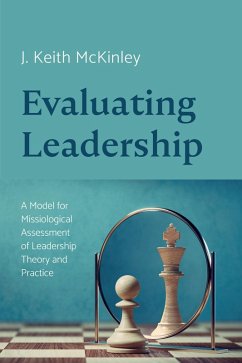
An Ordinary Mission of God Theology (eBook, ePUB)
Challenging Missional Church Idealism, Providing Solutions
Versandkostenfrei!
Sofort per Download lieferbar
16,95 €
inkl. MwSt.
Weitere Ausgaben:

PAYBACK Punkte
8 °P sammeln!
The mission church literature seems to be dominated by idealized conceptions of the benefits of equipping congregations to participate in local mission work. This investigation challenges this idealism, by paying critical attention to congregants' ordinary theologies that develop in reaction to the communication of Missio Dei theology to them. Their voices are absent from the formal literature. The study employs rescripting methodology to modify key assumptions made in the formal ecclesiological literature by drawing on insights that come from Christians' ordinary theological voices. The study...
The mission church literature seems to be dominated by idealized conceptions of the benefits of equipping congregations to participate in local mission work. This investigation challenges this idealism, by paying critical attention to congregants' ordinary theologies that develop in reaction to the communication of Missio Dei theology to them. Their voices are absent from the formal literature. The study employs rescripting methodology to modify key assumptions made in the formal ecclesiological literature by drawing on insights that come from Christians' ordinary theological voices. The study traces how the introduction of a Missio Dei theology to a British Reformed congregation had a significant impact on them. A small team of Christian leaders communicated Missio Dei theology to this church over a period of six years. It found that mission changes came at substantial personal cost to the church's members: 1) a schism occurred when congregants attempted to remove the leader responsible for these changes from his office as church pastor, and a third of congregants left the church because they did not want to embrace the church's new mission identity; 2) three divergent groups then emerged--two of them wanted different kinds of churches that seemed incompatible; 3) two thirds of members supported and participated in the church's mission activities, which put strains on some of their families; 4) unresolved tensions continued to impact the congregation throughout the whole change process; 5) unexpectedly, for a Reformed church, a third group made up of women developed prophetic practices that arose due to the mediation of Missio Dei theology. Vitally, this thesis challenges the notion that helping churches to become mission-focused will make them thrive.
Dieser Download kann aus rechtlichen Gründen nur mit Rechnungsadresse in A, D ausgeliefert werden.













